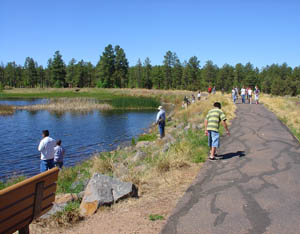 We are pleased to present to you the final design synthesis that has come as a result of weeks of reviewing the design concepts, resident feedback, as well as gaining further insight into the acquisition scenarios and smart growth and development principles. The information contained in this presentation reflects that greater understanding and synthesis of the concepts.
We are pleased to present to you the final design synthesis that has come as a result of weeks of reviewing the design concepts, resident feedback, as well as gaining further insight into the acquisition scenarios and smart growth and development principles. The information contained in this presentation reflects that greater understanding and synthesis of the concepts.
In order to provide the greatest benefit to the town staff, planners, and community members, we have synthesized the concepts into three distinct acquisition and planning options:
- a non-development land acquisition option predicated Federal and/or State funding
- a conventional development option as evidenced in its traditional suburban street layouts and residential lot densities
- a dense non-conventional "new urbanist" or traditional neighborhood development option
You may use the links to the left to navigate through the final synthesized concepts. The supplemental information link will provide additional information that is also being included in the appendix of the final document. That page will also link to a .pdf file of the final document for review.
Concluding Thoughts
The Tejido Group has presented a range of possible acquisition scenarios, discussed in the Analysis Chapter, to the community of Pinetop-Lakeside. From the outset, it has been our recommendation that the town pursue several of these options in a multi-pronged approach. To put it another way, Pinetop-Lakeside should not “put all its eggs in one basket” where Woodland Lake Park is concerned. Research on feasibility and funding possibilities for all scenarios should thus be simultaneously pursued. Though a non-development scenario is preferable to all parties, it is best to plan for any eventuality. While a strong and coordinated effort should be put towards securing the park as a national recreation area or state park, there should also be an effort to explore possible development strategies and interests. Therefore, if development becomes a necessity, the town will be prepared to direct the development in a forward-thinking and responsible way.
Parallel to this comprehensive strategy, public forums should begin to coalesce and articulate public opinion regarding the options. The 20 20 Vision Committee has stepped forward in this respect, and it is our hope that the work that they have begun will continue as the process moves forward.
webdesign by chris rose
